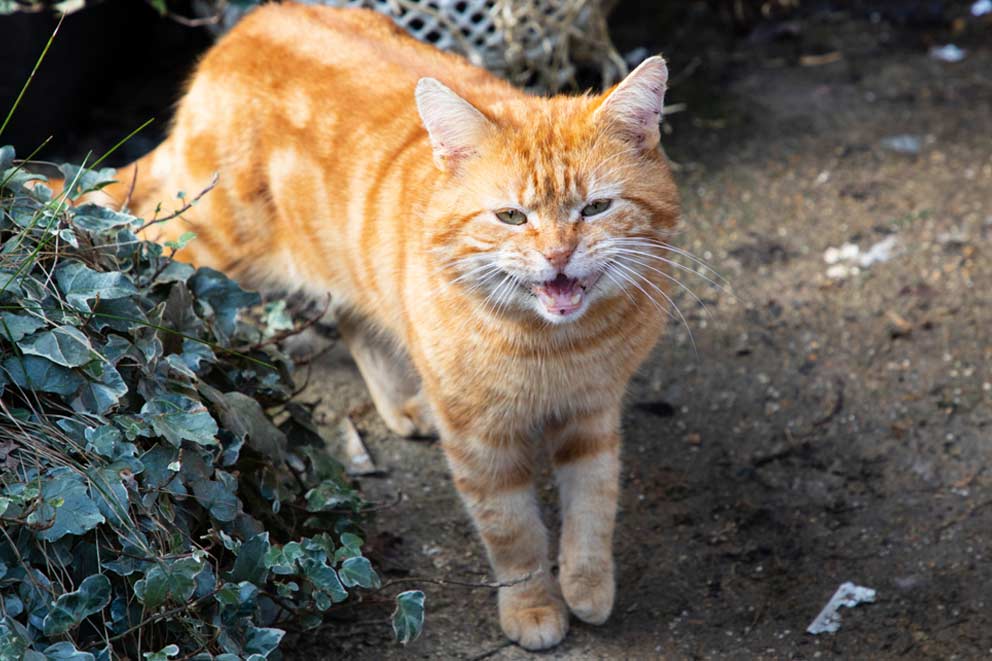Found a lost cat
We have practical advice on what to do if you find a lost, stray or feral cat.

How to help a stray cat
It can be hard to tell if a cat is stray, is roaming but owned or living as a feral. As a charity with limited resources, we can't respond to calls about healthy stray cats - our priority has to be helping animals suffering from cruelty and neglect.
Here's what to do if you find a stray, feral or lost cat:
- Check to see if the cat is wearing a collar or tag with the contact details of the owner - only approach if the cat is calm.
- Ask around locally. Cats roam over a wide area and sometimes they can be mistaken for strays even when they have owners.
- Contact the local vet to scan for a microchip.
- Advertise on social media and ask around locally.
- Register the found cat on Animal Search UK.
Found an injured stray cat
- If you find an injured stray or feral cat and they're approachable, contain them and take them to a vet.
- If you're taking a sick or injured stray cat to the vet and the cat just needs minimum care, you might be expected to take the cat away and fit a paper collar if needed.
- Contact your local animal shelter or cat charity to see if they can help.
-
- If cat appears healthy, leave the cat alone.
- If the cat is sick or injured contact your local vet.
- If the cat is in a dangerous location then contact the emergency services.
-
If you've found a pregnant cat who you think is in labour:
- Give her space - avoid disturbing her.
- Try to locate her owner - post on local social media groups or speak to neighbours to see if anybody knows her. If you can't find the owner, please call a local animal rescue centre for advice on what to do when the kittens arrive.
- Placing a shallow bowl of water nearby - this should be done with minimal disturbance, keep a good distance.
- Place some shelter nearby - depending upon the weather, placing some shelter nearby could help keep her shaded from the sun and sheltered from cold winds and rain.
- Keep an eye on her to check she's doing ok, but avoid disturbing her as it could cause unnecessary problems for the kittens.
Many cats give birth without needing any help at all, but signs she may be having difficulty include:- If between 30 and 60 minutes of intense straining she doesn't produce a kitten or a kitten seems to be stuck.
- The mother seems to be noticeably distressed.
- If she seems lethargic, has passed an unpleasant discharge or is bleeding heavily from her vulva (green, brown or red discharge while the kittens are being born is normal).
- If you see any of these signs or if mum is at risk because she's near a busy road or building, please call a local vet, animal rescue centre or contact us. Never put yourself in danger.
-
- If a stray cat has just had kittens, it may be best to leave them for a few days. If anyone tries to move them, the mother may reject or even kill the kittens. After a few days, she'll move them anyway once she realises you know where they are.
- If mum and kittens appear to be healthy and are in a safe area, it's best to leave them alone - don't move them unless they're at risk. You can follow our advice above to try to find the cat's owner. If you can't find them and you think mum is a stray, call your local animal rescue for advice. They may talk to you about giving a helping hand by providing food, water and outside shelter to help protect mum and kittens from extreme weather.
- If mum and/or the kittens seem to be sick or injured, phoning a local vet for advice is the best and quickest way to help. It's important that mum and kittens stay together. If you need to transport them and aren't able to do so safely, or if the stray cat rejects a kitten, please contact us or your local animal rescue centre. Never put yourself in danger.
-
- If you find kittens on their own, please keep a good distance to avoid disturbing them and scaring mum into not returning. It's not unusual for mum to leave her kittens when she goes to find food. Kittens have a much better chance if they stay with their mum, so it's very important to give them enough time to see if mum returns before assuming they're orphaned.
- If the kittens appear to be in danger because they're wet, cold or sick, please call a local vet or, animal rescue charity. or our advice line as soon as possible.
- If the kittens are very young - with eyes that are still closed and little mobility - you should monitor them for around two hours before phoning a vet or your local rescue charity.
- Older kittens can usually go a little longer without food, so for those who have their eyes open and can walk, you should monitor for mum's return for around four hours before calling for advice. It's best to leave the kittens where they are unless a vet advises otherwise.
Rehoming a stray cat
You can rehome a stray cat if you can't find an owner. Kittens can be rehomed when they're eight weeks old. If you're unable to keep the cat, a local animal rescue charity may be able to help. Try contacting your local RSPCA animal centre, Cats Protection or other reputable organisations.



